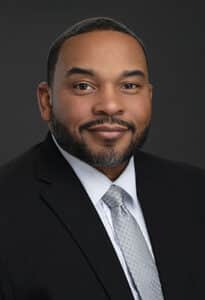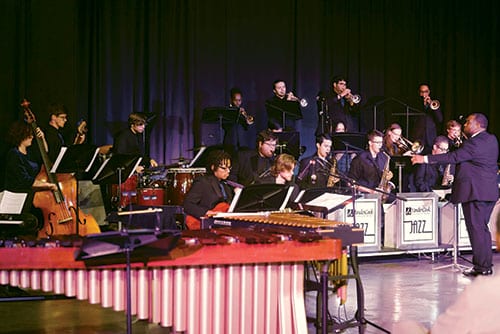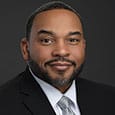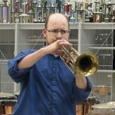
Much like a jazz solo that takes some unexpected turns, Roosevelt Griffin III has followed a different career path than he originally intended. He entered Northern Illinois University hoping for a performance career and graduated with a BM in Music Performance (Tuba). While he worked with a variety of touring groups and such performers as Diana Ross and the Three Tenors, he quickly pivoted to a teaching career and returned to his childhood middle school in Harvey, Illinois. His career accolades include taking groups to the Midwest Clinic and Chicago Jazz Festival, the 2022 John LaPorta Jazz Educator of the Year Award from the Jazz Education Network, and being named a Best Music Educator Semifinalist by the Grammy Foundation.
Griffin also earned degrees from Concordia College and Argosy University. After nearly two decades of teaching middle school students, he was named the Walter Dyett Chair for Jazz Studies, Diversity, and Inclusion at VanderCook College of Music in Chicago and is the Youth Ensemble Director for the Chicago Jazz Philharmonic. The City of Harvey has renamed a street in his honor as Roosevelt Griffin III Avenue.
Who inspired you to teach music?
I was raised by my mother, but my biological father was a well-known guitarist. I didn’t get any instruction from him, but I knew that he played. By 4th grade I decided to try music just to be like him and joined the band at Riley Elementary School in Harvey. The director, John Weber, is well-known even now and spent most of his time in the band room. He took me and several other students under his wing and had a huge influence on me. I recall seeing the Canadian Brass perform for the first time with him.
When I continued in music at Thornridge High School, director David Eanes became a father figure for me, and I wanted to be like him. It wasn’t just because of music – he connected with students in a way that made me want to be like him.
By my junior year, my career goal changed from wanting to be an architect to wanting to become a band director and build outstanding music groups in every area. I continued my musical study at Northern Illinois University where I met Ronald Carter. I went to college to major in tuba and play in the orchestra, but I was also able to get in the jazz ensemble and study with Carter for several years. He was a major influence.
What was it like to go back to your middle school as a director and work with your former director?
John Weber is a legend. He took a jazz ensemble to IAJE back in 1988, so the program had a rich tradition, not only in jazz, but throughout the entire music program. The Harvey Grade School Band, established in 1928, is one of the oldest in Illinois, and earned its first superior rating in 1931. I knew I had huge shoes to fill when I went back to teach there.
In my first year, Weber and I co-directed the program. I learned so much from him. Because he led the concert band that year, I took over the afterschool jazz program. I wanted to spend more time with students and have an ensemble that I could lead. Early in my career, I dreamed of becoming a high school director and said I would never teach middle school. My first teaching job after college was a full-time substitute position at an elementary school, but I still didn’t want to teach middle school.

What is a lesson you learned in the early years of teaching?
In my first few years, I really wanted to prove myself as an educator and went too far chasing trophies. At one memorable competition, my jazz band didn’t play well. They weren’t focused and didn’t practice, but somehow we came in first place anyway. Students were excited and laughing about the surprise win. At the same event, our symphonic band was exceptional and came in sixth place out of 30 bands. Members of the jazz band made fun of the symphonic band players, leaving some in tears.
I didn’t realize it at the time, but the jazz band celebrated the victory partly because they knew winning the trophy was important to me. That was a turning point; I realized that I was doing something wrong and shifted gears. Every trophy displayed in the band room went to the storage room. For the next 15 years, until I left, you didn’t see any trophies displayed in the band room. I wanted to make sure that everything we did was about the development of the band, and the development of individuals.
I still wanted our groups to sound good, but I realized that I had an opportunity to do much more than just teach music. I spent more time getting to know students and developing a family that extended beyond a classroom. By my fourth year, I realized the true power of music. I was able to connect what I was sharing with those kids with what my mentors gave to me. It was an opportunity to build up these students and their families. It reached a point that it was family. I always say that my success as an educator had a lot to do with those who influenced me and also the parents who decided to partner with me to make sure that their students had great experiences. I am so grateful to those parents who trusted me.
How did your reluctance to teach middle school band change over the years?
Students in middle school are ages 11-14, and I was amazed by their growth through those important years. Directors have a unique position because in other classes, students have a different teacher every year. We are the one constant in their lives. We can make the greatest impact because year after year they trust their band director. We have an obligation to see them through the most transformative period of their lives. We are there with them.
Even in college, I was already interested in mentoring and working with young people so becoming a middle school director turned out to be incredibly fulfilling. I didn’t accomplish all of my early goals. Musically, I wasn’t ever able to program grade 6 music, which I thought might be possible when I was preparing to be a director. However, there was so much else I was able to do to help these students become teenagers and young adults.
After about ten years as a teacher, a number of students came back to visit. Many were continuing to play music, but they also spoke of how their experience in band continued to be meaningful to them as adults. One former band student from around 2006 has become a general surgeon. Harvey can be a rough city, and she grew on a block near many abandoned houses. In her entrance letter to medical school, she spoke about how her experience in middle school band transformed her life.
It is so rewarding to see how the experiences we create can truly impact lives for years. That is true for most teachers, but music is different because it empowers each student to be themselves among other empowered students. We accept students as they are and don’t try to transform them but instead allow them to grow into who they are.

What led to establishing the Griffin Institute for the Performing Arts in 2016?
I felt like I owed the City of Harvey for what it gave to me. When my middle school students graduated from eighth grade, I had no control over what happened to them. I saw phenomenal students have a difficult time in high school, and many gave up on band. As a professional, I didn’t believe in complaining about what was or was not happening at the next level. I wanted to keep a handle on these students to help them through high school.
The Griffin Institute allowed me to draw on my network of people who care about kids to help with this cause and mentor students. We created a place where students could hang out and we could talk to them and provide great experiences. Regardless of what school they attended, we wanted to create a place that was a steady force in their lives. It is a place that supported their gifts where they could get mentorship, play, laugh, and do homework. They might not continue in music but they would always remember being part of a family. A lot of kids join gangs and get into trouble for the same reason. They want to belong to something.
Some of those students went on to study at Tennessee State. They just won two Grammys and became the first HCBU to perform at the Midwest Clinic. The culture and many of the principles we established have continued to the collegiate level. That means a lot to me.
How do you approach your rehearsals, and what do you emphasize?
My rehearsals look different depending on what is going on that day. I might plan to work on a certain piece and end up shifting gears depending on the energy of the students. Right before rehearsal, we might be working on a blues, and I’ll hear something and decide to start rehearsal with a bass line. I might have everybody join and start trading fours or do call-and-responses. If the energy is right, this could go on for 30-45 minutes and take most of rehearsal. I believe in using the energy of the students to move forward the lesson or the knowledge they are expected to learn.
Most often, I will have music playing for them to listen to as they sit down and get their instruments out. Then, I might give them a cue to listen to and then repeat the same tune followed by a discussion about what they heard. I could ask if they noticed what happened with the bass line and hi-hat. They will probably say no, so we will listen to it again.
I don’t believe in blues scale warm-ups because students often associate them with solos. A lot of times you will hear those scales pop up in their solos, and it sounds like the same scale over and over. It is better to learn the melody first and scales second. If I use improvisation in warm-up, I put on a backing track and go around the room and have exercises where each student does four bars. I firmly believe in warming up on the same things we warm up on in concert band – long tones, lip slurs, chromatics, and more.
What is something about how jazz is taught that you would change if you could?
All directors do the best they can, but sometimes there is a lack of knowledge about the development and history of jazz. If you are going to teach jazz, you have to take responsibility for listening to and dealing with the entire tradition of jazz. I’m not saying you have to spend the whole year on it, but at a certain point, you must teach where the music came from. Some talented directors believe that they have the skills to get the music right, so they skip over the history, the blues, and a careful exploration of the culture. Studying jazz history can be as informal as sitting down together and listening to a legend play or to interviews about how we got to this point.
Jazz is so much more than what we hear. It is a way of life and a culture. It is like food. When I go out to eat, certain restaurants are authentic restaurants and others are commercial restaurants. Sometimes, commercial restaurants are cool, but when you go to an authentic restaurant, you are going to experience the music when you walk in, certain spices, art on the wall, and colors that all represent the actual culture.
What do you do to keep learning and growing as a teacher?
The biggest resource for me is going to festivals as a director to learn from experts and professionals who work with the band. That has helped me the most. If I ever took a band somewhere, I wouldn’t walk off when the band is working with a clinician. I would sit down. That has been my best resource, sitting next to my band with my notepad out. That is my textbook.
After years of teaching students just coming up in school music, you are now teaching students who will be leading those rehearsal rooms in the next generation. What have you learned from your first year at VanderCook and what surprised you about your daily work?
I am a reflective educator who constantly measures the impact and possible impact my work. Being at VanderCook provides me an opportunity to make the greatest impact possible by sharing my perspectives with future educators. The unique skills that I developed as an elementary and middle school educator are now being used to prepare future teachers. Our goal at VanderCook is to prepare students for success in any environment they are placed. I want students to leave VanderCook with the confidence to use the communal and creative components found in jazz to serve their students in a way that assists them in becoming that best version of themselves.
When I joined VanderCook, I was surprised at how receptive the faculty and students were to my non-traditional methods and pedagogy. They have allowed me to be as creative as I desire, and they have supported my efforts 100%. I was also impressed with the community within the college. From the leadership, to the faculty, to the students, everyone is treated with respect. The college has welcomed me, just as they welcome every student, with warm and open arms.
In the near future, we plan to expand the jazz offerings at the college by adding courses, workshops, performances, and expert clinicians to the schedule. Although our students and ensembles are amazing and highly skilled, we are not a performance school and are clear about our mission. The expansion of our jazz offering isn’t designed to position our students to be professional jazz musicians, but they are designed to help our students to be exceptional music educators.
Having faced some challenging early years in your career, what advice do you have for other directors just starting in the profession?
If you look at me, I was a tuba player who wanted to play in orchestras, who wanted to lead high school marching bands and win national championships someday. I was placed in a position where I had to be led by my heart. Understand that we each have fingerprints, God-given gifts, talents that only we can use. The very thing that makes you unique will be the thing that helps you reach success. With my background and because I didn’t know jazz as well as some of my friends, I came to it with a unique perspective. When I was with my students, my pedagogy was very fundamental. I also had the background of mentoring and really cared about students. All of those things got the jazz program going. I didn’t plan to do that; it just happened. I embraced who I was and did my best every moment for the kids.






